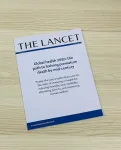(Press-News.org) Montpellier, France – 15 October 2024. In a captivating Genomic Press Interview published on October 15, 2024, in the peer-reviewed journal Genomic Psychiatry (Genomic Press), Professor Philippe Courtet shares groundbreaking perspectives on suicide prevention and mental health care. As an influential PU-PH (Professeur des Universités-Praticien Hospitalier), he is a Professor of Psychiatry at the University of Montpellier, France, and head of emergency psychiatry at the University Hospital of, Professor Courtet stands at the forefront of a paradigm shift in understanding and treating suicidal behavior.
Professor Courtet's innovative research uniquely blends genomics, brain imaging, and social pain studies, offering unprecedented insights into the complex mechanisms underlying suicidal tendencies. "Quantum computing allows us to model molecular behavior at a level of detail that was previously unimaginable," Professor Courtet explains. "We're now able to simulate drug interactions with unprecedented accuracy, potentially reducing the time and cost of bringing new medications to market by years."
This multidisciplinary approach raises intriguing questions about the interplay between biological predispositions and environmental triggers in suicidal behavior. How might personalized interventions, tailored to an individual's genetic and neurobiological profile, transform suicide prevention strategies?
Professor Courtet's work challenges traditional psychiatric care models, advocating for a proactive approach to patient engagement. "My main concern remains that of the necessary evolution of psychiatric care, in a country that still has a strong tradition of psychiatric hospitalization," he states. This pioneering stance prompts us to consider: How can healthcare systems evolve to reach vulnerable individuals before they reach crisis points?
The interview delves into Professor Courtet's fascination with the mechanisms of interoception – how the body processes internal signals. This research opens up new avenues for understanding the transformation of psychological pain into physical self-harm. It begs the question: Could interventions targeting interoceptive processes offer new therapeutic possibilities for individuals at risk of suicide?
Professor Courtet's commitment to precision suicidology represents a significant leap forward in mental health research. By integrating advanced technologies like connected health tools, his team is developing innovative methods for suicide risk assessment. This approach raises important considerations about the ethical implications and practical challenges of implementing such technologies in diverse healthcare settings.
The Genomic Press Interview also offers a glimpse into the personal journey that shaped Professor Courtet's career. His early passion for Surrealism and contemporary art provides a unique lens through which he approaches scientific inquiry. "Combining clinical and scientific work has been my constant priority for the last 30 years," Professor Courtet reflects. This interdisciplinary perspective invites us to ponder: How might integrating artistic and cultural insights enhance our understanding of mental health and suicide prevention?
Professor Courtet's research on social and relational stress factors as precipitants of suicidal acts introduces a critical dimension to suicide prevention strategies. By examining the links between peripheral and central nervous system responses to stress, his work illuminates potential pathways for intervention. This raises the question: How can society better address the social determinants of mental health to create more supportive environments for vulnerable individuals?
As Chair of Excellence in suicide prevention at the Fundamental Foundation and leader of the 'biomarkers, environment and neuropsychiatry' research group at INSERM, Professor Courtet continues to push the boundaries of suicidology. His vision for a more compassionate and scientifically informed approach to mental health care holds promise for saving countless lives.
Professor Philippe Courtet’s Genomic Press interview is part of a larger series that highlights the people behind today’s most influential scientific ideas. Each interview in the series offers a blend of cutting-edge research and personal reflections, providing readers with a comprehensive view of the scientists shaping the future. By combining a focus on professional achievements with personal insights, this interview style invites a richer narrative that both engages and educates readers. This format provides an ideal starting point for profiles that delve into the scientist’s impact on the field, while also touching on broader human themes. More information on the research leaders and research rising stars featured by Genomic Press can be found in our website: https://genomicpress.com.
The full Genomic Press Interview with Professor Philippe Courtet, titled “Philippe Courtet: ‘Hell is other people.’ How social pressure shapes suicidal thoughts,” is available on 15 October 2024 in Genomic Psychiatry. It offers an in-depth look at the future of psychiatry and suicide prevention, providing valuable insights for researchers, clinicians, and policymakers alike. The article is freely available online at https://gp.genomicpress.com/aop/.
About Genomic Psychiatry – Genomic Psychiatry: Advancing Science from Genes to Society (ISSN: 2997-2388) represents a paradigm shift in genetics journals by interweaving advances in genomics and genetics with progress in all other areas of contemporary psychiatry. Genomic Psychiatry publishes peer-reviewed papers of the highest quality from any area within the continuum that goes from genes and molecules to neuroscience, clinical psychiatry, and public health.
END
Quantum leap in suicide prevention: Professor Philippe Courtet's visionary approach unveiled in Genomic Press Interview
Exploring the genetic and environmental factors behind suicide with leading psychiatrist Philippe Courtet
2024-10-15
ELSE PRESS RELEASES FROM THIS DATE:
Need for streamlined miscarriage care in Canada
2024-10-15
Miscarriage, or early pregnancy loss, can have devastating emotional effects, but it is poorly managed in Canada. A review published in CMAJ (Canadian Medical Association Journal) https://www.cmaj.ca/lookup/doi/10.1503/cmaj.231489 provides guidance to physicians on how to diagnose and manage this condition and calls for referral to outpatient early pregnancy assessment clinics (EPACs) as well as a compassionate approach.
October 15 is Pregnancy and Infant Loss Remembrance Day.
Data suggest that 15%–20% of all confirmed pregnancies result in miscarriage, with ...
Traces of ancient immigration patterns to Japan found in 2000-year-old genome
2024-10-15
A joint research group led by Jonghyun Kim and Jun Ohashi of the University of Tokyo has demonstrated that the majority of immigration to the Japanese Archipelago in the Yayoi and Kofun periods (between 3000 BCE and 538 CE) came from the Korean Peninsula. The researchers analyzed the complete genome of a “Yayoi” individual and found that, among the non-Japanese populations, the results bore the most similarity to Korean populations. Although it is widely accepted that modern Japanese populations have a dual ancestry, the discovery provides insight into the details of immigration patterns to the ...
Countries that choose to do so can reduce premature death by half, researchers say
2024-10-14
DURHAM, N.C. -- Since 1970, 37 countries have cut the probability of their citizens dying before they reach age 70 in half, a milestone that signals the remarkable progress many countries have made in preventing and treating disease. But a new report argues that this goal isn’t out of reach for any country that chooses to cut its premature mortality, even those afflicted by war or poverty.
The report, published Oct. 14 by The Lancet Commission on Investing in Health, lays out a roadmap for every nation that chooses to do so to cut ...
50 by 50—How can we reduce the probability of dying before age 70 by 50% globally by 2050?
2024-10-14
A team of 50 leading international experts, the Lancet Commission on Investing in Health (CIH), explored this question, resulting in clear, actionable, and achievable measures for achieving this ambitious goal worldwide. Six of the 50 commission members are affiliated with the Bergen Centre for Ethics and Priority Setting in Health (BCEPS), a Norwegian Centre of Excellence based at the University of Bergen, Norway, including BCEPS Director and Professor Ole Frithjof Norheim, BCEPS PhD Research Fellow Sarah Bolongaita, and BCEPS-affiliated researchers Angela Chang (University ...
Research explains why some cyclists don’t wear helmets and what might convince them to wear one
2024-10-14
Copenhagen, Denmark: Wearing a helmet can prevent brain injury and deaths in cyclists, yet many do not wear a helmet. New research presented at the European Emergency Medicine Congress today (Tuesday) suggests that this is largely due to issues of convenience and comfort. [1]
The study also suggests that more adult cyclists would wear helmets if they were encouraged and incentivised to do so, for example if they were provided with a free helmet, education, and periodic reminders.
The research was presented by Dr Steven Friedman, an emergency doctor at Toronto General Hospital and associate professor at the University ...
Half of all patients with sepsis die within two years
2024-10-14
Copenhagen, Denmark: Half of all patients with sepsis admitted to an emergency medical department died within two years, according to Danish researchers investigating factors that could predict outcomes for these patients.
Dr Finn E. Nielsen, a senior scientist in the Department of Clinical Epidemiology at Aarhus University Hospital, Denmark, told the European Emergency Medicine Congress today (Tuesday) [1] that he and his colleagues examined deaths over a long follow-up period in a prospective study of 714 adult patients admitted to the emergency department with sepsis. Their findings ...
Native Hawaiian and Pacific Islander adults have third highest cardiovascular death rate in the U.S.
2024-10-14
Embargoed for release until 5:00 p.m. ET on Monday 14 October 2024
@Annalsofim
Below please find summaries of new articles that will be published in the next issue of Annals of Internal Medicine. The summaries are not intended to substitute for the full articles as a source of information. This information is under strict embargo and by taking it into possession, media representatives are committing to the terms of the embargo not only on their own behalf, but also on behalf of the organization they represent. ...
Gene therapy automatically converts omega-6 to omega-3 fatty acids in the body
2024-10-14
St. Louis, MO (October 14, 2024) According to the Centers for Disease Control, nearly 20% of children and teens are considered obese. Research shows it can have a dramatic impact on a variety of health conditions, including arthritis, heart conditions and other metabolic problems, and the American Academy of Pediatrics now recommends early and intensive treatment to combat obesity. Over the last four years, Shriners Children’s St. Louis researchers have been working to develop a new way to prevent the effects of childhood obesity.
Using gene therapy, Shriners Children’s St. Louis Director of Research Dr. Farshid Guilak and Senior Scientist Dr. Ruhang Tang ...
Mpox clinical presentation, diagnostic approaches, and treatment strategies
2024-10-14
About The Study: Mpox is a viral infection transmitted primarily through close skin to skin contact that typically causes a self-resolving illness but can result in severe illness and death in immunocompromised individuals. First-line therapy is supportive care, although patients with severe mpox infection may be treated with advanced therapeutics. Mpox vaccination is effective and, if available, should be offered to individuals at risk of exposure to mpox.
Corresponding Author: To contact the corresponding author, Jason Zucker, MD, MS, email Jz2700@cumc.columbia.edu.
To access the embargoed study: Visit our For The Media ...
Trends in oral and injectable HIV preexposure prophylaxis prescriptions in the US
2024-10-14
About The Study: Preexposure prophylaxis (PrEP) use increased between 2013 and 2023, with generic tenofovir disoproxil fumarate/emtricitabine (TDF/FTC) being the most frequently prescribed medication since 2021. Injectable PrEP use was low likely because of barriers such as the high cost of stocking this expensive medication in clinics.
Corresponding Author: To contact the corresponding author, Laura M. Mann, PhD, MPH, email lmann@cdc.gov.
To access the embargoed study: Visit our For The Media website at this link https://media.jamanetwork.com/
(doi:10.1001/jama.2024.21493)
Editor’s ...
LAST 30 PRESS RELEASES:
The Lancet: First-ever in-utero stem cell therapy for fetal spina bifida repair is safe, study finds
Nanoplastics can interact with Salmonella to affect food safety, study shows
Eric Moore, M.D., elected to Mayo Clinic Board of Trustees
NYU named “research powerhouse” in new analysis
New polymer materials may offer breakthrough solution for hard-to-remove PFAS in water
Biochar can either curb or boost greenhouse gas emissions depending on soil conditions, new study finds
Nanobiochar emerges as a next generation solution for cleaner water, healthier soils, and resilient ecosystems
Study finds more parents saying ‘No’ to vitamin K, putting babies’ brains at risk
Scientists develop new gut health measure that tracks disease
Rice gene discovery could cut fertiliser use while protecting yields
Jumping ‘DNA parasites’ linked to early stages of tumour formation
Ultra-sensitive CAR T cells provide potential strategy to treat solid tumors
Early Neanderthal-Human interbreeding was strongly sex biased
North American bird declines are widespread and accelerating in agricultural hotspots
Researchers recommend strategies for improved genetic privacy legislation
How birds achieve sweet success
More sensitive cell therapy may be a HIT against solid cancers
Scientists map how aging reshapes cells across the entire mammalian body
Hotspots of accelerated bird decline linked to agricultural activity
How ancient attraction shaped the human genome
NJIT faculty named Senior Members of the National Academy of Inventors
App aids substance use recovery in vulnerable populations
College students nationwide received lifesaving education on sudden cardiac death
Oak Ridge National Laboratory launches the Next-Generation Data Centers Institute
Improved short-term sea level change predictions with better AI training
UAlbany researchers develop new laser technique to test mRNA-based therapeutics
New water-treatment system removes nitrogen, phosphorus from farm tile drainage
Major Canadian study finds strong link between cannabis, anxiety and depression
New discovery of younger Ediacaran biota
Lymphovenous bypass: Potential surgical treatment for Alzheimer's disease?
[Press-News.org] Quantum leap in suicide prevention: Professor Philippe Courtet's visionary approach unveiled in Genomic Press InterviewExploring the genetic and environmental factors behind suicide with leading psychiatrist Philippe Courtet



